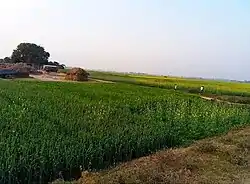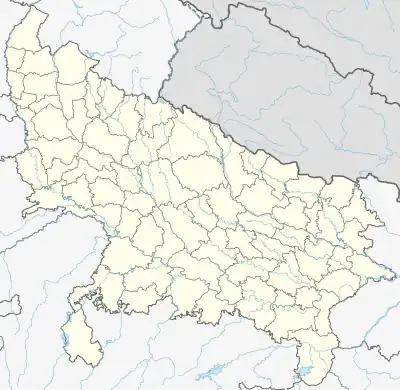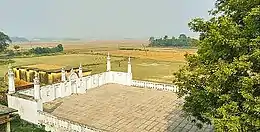Saraila
Saraila is a village in Kamsaar in the Indian state of Uttar Pradesh.Saraila is a village in Seorai Tehsil in Ghazipur District of Uttar Pradesh, India. It belongs to Varanasi Division . It is located 30 km to the south of District headquarters Ghazipur. 11 km from Seorai. 372 km from State capital Lucknow. The village (or region of the village) was also a part of Daudpur Estate which had its capital at Dewaitha.[1][2]
Saraila
Daulahabad | |
|---|---|
village | |
 Green Farms of Saraila village. | |
 Saraila Location in Uttar Pradesh, India | |
| Coordinates: 25.3926504°N 83.6663587°E | |
| Country | |
| State | Uttar Pradesh |
| District | Ghazipur |
| Established | 1640 |
| Founded by | Zamindar Mohammed Yar khan |
| Government | |
| • Body | Gram panchayat |
| Area | |
| • Total | 778.25 ha (1,923.10 acres) |
| • Land | 773.462 ha (1,911.266 acres) |
| • Water | 4.788 ha (11.831 acres) |
| Population (2011) | |
| • Total | 4,465 |
| • Density | 570/km2 (1,500/sq mi) |
| Languages | |
| • Official | Hindi |
| Time zone | UTC+5:30 (IST) |
| Vehicle registration | UP |
| Website | up |
Saraila Pin code is 232326 and postal head office is Dildarnagar .
Tajpur Kurra (2 km), Arangi (4 km), Nirahukapura (4 km), Devaitha (4 km), Kajuri ( 4 km), chitarkoni(3 km), Mircha(1.5 km) are the nearby villages to Saraila . Saraila is surrounded by Sevrai Tehsil towards North, Ramgarh Tehsil towards South, Zamania Tehsil towards west.
Zamania, Mohania, Ghazipur, Buxar are the nearby Cities to Saraila[3]
History

Saraila village was established by Muhammed Yar Khan in 1640 AD, who was Grand son of Sarkar Diwan Kuttul Kan Zamindar Jagirdar taluka Sawerai. Kuttul khan was a Great Grand son of Narhar khan founder of kamsar pathans and Dildarnagar kamsar. Kuttul Khan had two sons name as Zamindar Hussain Khan and Zamindar Daulah Khan. His second son Zamindar Daulah Khan also had two sons name as Muhammad Yar Khan and Muhammad Saleem Khan. Muhammad Yar Khan got the ancestral zamindari of the place and there he established Saraila village. Saleem Khan established Chitarkoni village. When Muhammad Yar Khan established the village he build a Mosque in the village name as Jama Masjid. He also built an Eidgah in the 1650s. Name as Badi eid gah of Saraila. Zamindar Muhammad Yar Khan also built a Mosque in the village name as Badi Jumma Masjid later, after 2-3 generations (say, early 1700s) his family made one more Mosque in the village name as Choti Jama Masjid. Choti Jama masjid or Nai masjid was later renovated in 2008 by his descendants and village people.[4][3]
Agriculture
According information village is located in Zamania Tehsil of Ghazipur district in Uttar Pradesh, India. It is situated 15 km away from sub-district headquarter Zamania and 35 km away from district headquarters Ghazipur. Saraila has a total population of 4,465 peoples. There are about 644 houses in Saraila village. Crops which grow in Purvanchal and eastern Bihar are grown in the village. The total area of the village is 1923 acres and crop production area of village is 1890 acres. The village have harvesters and tractors for harvesting activities The village also have mosque, temple and Eidgah. The village also have one english medium private school and government school and Madarsa. The village also have pond and located on the banks of karamnasa river. As of 2011 census the main population of the village lived in an area of 76 acres and had 644 households.[5]
Historical Population
| Year | Pop. | ±% |
|---|---|---|
| 1861 | 1,600 | — |
| 1871 | 2,008 | +25.5% |
| 1881 | 2,080 | +3.6% |
| 1891 | 2,210 | +6.2% |
| 1901 | 2,320 | +5.0% |
| 1911 | 2,452 | +5.7% |
| 1921 | 2,595 | +5.8% |
| 1931 | 2,756 | +6.2% |
| 1941 | 2,932 | +6.4% |
| 1951 | 3,025 | +3.2% |
| 1961 | 3,022 | −0.1% |
| 1971 | 3,325 | +10.0% |
| 1981 | 3,560 | +7.1% |
| 1991 | 3,942 | +10.7% |
| 2001 | 4,200 | +6.5% |
| 2011 | 4,465 | +6.3% |
| Source:Census of India[6][7][8] | ||
References
- "Bhulekh".
- "2011 Census of India".
- Ansari, Saiyad Hasan (1986). "Evolution and Spatial organisation of Clan settlements in Middle ganga valley. A book by Ansari Sayed Hasaan (1986)".
- Choudhary, Bijoy Kumar (2017). Kaimur District Gazetteer. K. P. Jayaswal Research Institute. ISBN 9788189785147.
- "Bhulekh". upbhulekh.gov.in.
- "Census of India". mospi.gov.in. Archived from the original on 13 August 2008. Retrieved 23 June 2008.
- "2011 census of India".
- "Historical Census of India". Archived from the original on 17 February 2013. Retrieved 5 November 2015.